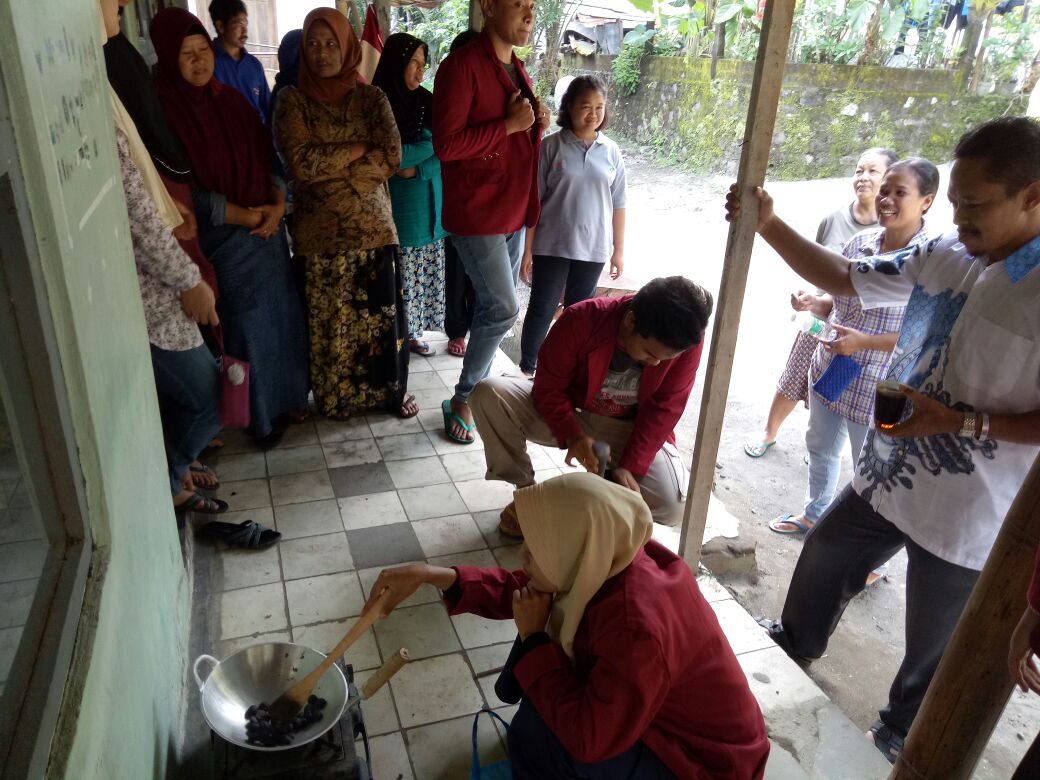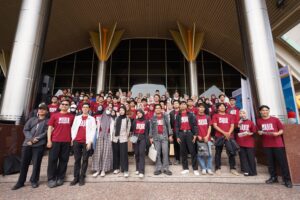 Salak is one of many fruits growing in Indonesia, and some benefits produced from Salak are including its seeds. For most people, Salak seed is only considered as waste, but waste does not always have no benefit at all. Therefore, it inspired one of the groups in community service (KKN), 12 of University of Muhammadiyah Yogyakarta (UMY) to give counselling and training to all villagers about how to make coffee of Salak seed in Potro, Purwobinangun, Pakem, Sleman, DI Yogyakarta.
Salak is one of many fruits growing in Indonesia, and some benefits produced from Salak are including its seeds. For most people, Salak seed is only considered as waste, but waste does not always have no benefit at all. Therefore, it inspired one of the groups in community service (KKN), 12 of University of Muhammadiyah Yogyakarta (UMY) to give counselling and training to all villagers about how to make coffee of Salak seed in Potro, Purwobinangun, Pakem, Sleman, DI Yogyakarta.
A group of ten people and a lecturer also as the Supervisor (DPL) watch there are much waste of Salak seed in that village, and no one wanted to take advantage of it. Many people in that village maybe do not understand yet of how to produce it to be drink powder. “This counselling did only intend to make a use of its waste, but also to see the situation of people in Potro who are mostly as Salak farmers and not many of them develop Salak,” said Muhammad Anshori, head of KKN 12 UMY on Saturday (3/2).
Counseling and training of coffee-making of Salak seeds were done on Sunday, January 28 by inviting Sri Sujarwati as creative industry developers of Salak. “In her presentation, Sri said that Salak fruit can have a higher selling cost, but Salak farmers must have an innovation to create products from Salak like chips, dodol, sweets, or coffee. If Salak is already produced in some forms of foods, the selling cost can be higher than the price in middleman. Moreover Salak processed is already well developed until out of Java,” Anshori explained.
The process of making Kentos coffee/seeds Salak takes some time because there are several steps that must be done. Starting from washing, drying, roistering, and pounding. “Salak seeds should be washed, then dried until completely dry. The drying process must be under the sunlight. If according to the experience of Mrs. Sri Sujarwati, the process will take about 30 days. Then, the dried seeds are roasted till it turns to black and has typical fragrance of Salak coffee. The roasting process takes about 15 to 30 minutes. For the next step, Salak seeds were pounded until smooth or can use blender machine to smooth it, “he added.
The activity involved the members of Family Welfare Development (PKK) of Padukuhan. Not only did they see the way of making coffee of Salak seed by Sri Sujarwati, but also they were invited to participate in the process of making it together with group of KKN 12 UMY. In the end of the training, they also did not hesitate to taste the result.
From the various processes, Salak coffee powder was ready to serve. The process could also produce 4 kg of coffee powder Kentos of 20 kg of seeds Salak. The price of kentos coffee produced from KKN 12 UMY group is Rp. 25.000 / 100 gram. Through the activity, Anshori and other members of KKN 12 UMY hope that all people in that village will be motivated to continue developing products of Salak until in marketing level. “Sustainably, we expect that people here can become both Salak farmers and entrepreneurs of Salak product, “he concluded.






